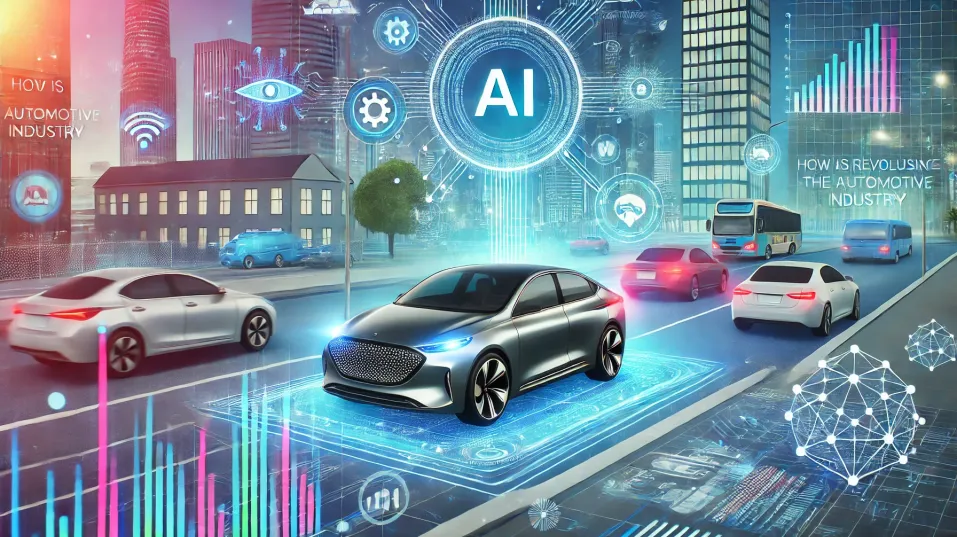How AI is Revolutionising the Automotive Industry?

The automotive industry is entering an exciting new chapter, with artificial intelligence in automotive industry taking the wheel. Imagine cars that do not just take us from point A to point B but actually understand us, adapt to our preferences & make our journeys smoother & safer.
AI automotive industry solutions are transforming every aspect of the sector—how vehicles are designed, manufactured, driven, & maintained—pushing the boundaries of automotive industry innovation.
However, with great transformation comes significant challenges. While AI brings remarkable benefits, the industry must address pressing issues to fully realise its potential. For instance:-
- Vehicles collect a lot of data about their drivers. Auto manufacturers must protect this personal information & ensure privacy is maintained.
- Since AI will make important decisions in life-threatening situations, the industry must find ways to ensure these decisions are made ethically.
Now, let’s deep dive into the impact, benefits, and technical aspects of the AI automotive industry transformation.
The Impact of AI in Transforming the Automotive Industry
1. AI-Driven Innovation in Manufacturing & Maintenance in the Automotive Industry
The use of artificial intelligence in automotive industry is pushing new standards for efficiency & auto industry innovation:
- Enhanced Efficiency: By automating repetitive duties, AI in manufacturing reduces manufacturing times, making vehicle assembly quicker at cost-effective rates. Advanced use of AI in the automobile industry monitors for problems, ensuring automotive artificial intelligence keeps high standards in manufacturing.
- Cost Savings through Predictive Maintenance: With AI vehicles manufactured with predictive analytics, the maintenance process is optimised. It supports & detects problems early. This minimises surprising repairs, extends vehicle life, & interprets into cost savings for manufacturers & customers.
- Generative Design: AI tools analyse large datasets to help auto manufacturers create sleeker, safer, & more fuel-efficient designs.
- Supply Chain Optimisation: AI streamlines logistics & inventory management. It will reduce production delays.
2. AI and Self-Driving Cars: The Path to Autonomy in Automotive Industry
Safety innovations powered by artificial intelligence in automotive industry are reshaping cars to be smarter & safer on the roads:-
- Machine Learning and Deep Learning: AI checks sensors, cameras, and radar to collect data & interpret it in real time. This lets self-driving vehicles drive just like humans.
- Computer Vision: AI systems help vehicles identify obstacles, pedestrians, & traffic signs. This is a crucial element for the future of autonomous cars.
- Hardware-in-the-Loop (HIL) Testing: The automotive industry uses Artificial Intelligence to simulate real-world driving conditions. It ensures safety & reliability.
3. Connected Vehicles: Redefining Communication in the Automotive Industry
AI is driving the rise of connected vehicles. It is reshaping how the automotive industry approaches communication & collaboration:
- Real-Time Data Exchange: AI enables vehicles to share updates on road conditions & hazards with other vehicles.
- Traffic Flow Optimisation: Automakers or car manufacturers use Artificial Intelligence to design systems that minimise congestion. It is a key focus in urban settings.
- Integration with Smart Cities: AI ensures that vehicles in the automotive industry can interact seamlessly with urban infrastructure.
Benefits of AI in the Automotive Industry
1. AI in Production and Quality Control
Artificial intelligence in automotive industry is improving quality checks. It is optimising the production & maintenance processes in the automotive industry. It enhances performance and operational & other costs:
AI in the automotive industry discovers minute defects on assembly lines, ensuring the best & most superb vehicles leave the manufacturing unit. AI in the automotive industry allows for quicker, error-free manufacturing.
2. AI in Automotive Design and Product Development
Artificial Intelligence is revolutionising the manner vehicles are manufactured, specialising in everything from fuel performance to aesthetics:
- Generative Design: Designers use AI to generate optimised designs. They are specifically used in high-performing sports cars. With AI, vehicle designs are continuously refined to improve aerodynamics, fuel performance, & visual appeal.
- Aerodynamic Enhancements: AI assists in designing streamlined vehicles, reducing drag & improving fuel efficiency. Leading automotive industries are using AI to reduce drag, boost performance, and support innovation in car manufacturing.
3. AI and the Push for Sustainability in the Automotive Industry
AI is also driving sustainability in the automotive world. Here’s how:
- Aerodynamic Designs: AI helps design vehicles with less air resistance or drag. This improves fuel efficiency & makes cars more eco-friendly.
- Electric Vehicle (EV) Advancements: AI is used to improve the performance of EV batteries. It helps increase their range, making EVs more attractive to consumers & supporting the shift to greener transportation.
Concerns and Considerations for AI in Automotive
However, with great transformation comes significant challenges. While AI brings remarkable benefits, the industry must address pressing issues to fully realise its potential. Key considerations include:
- Data Privacy and Security: Vehicles collect vast amounts of personal data. Suzuki R&D is safeguarding this information to protect consumer trust.
- Ethical Decision-Making: AI systems in self-driving cars may need to make life-or-death decisions. Ensuring ethical programming is critical.
- Regulatory Compliance: Governments must develop fair and balanced policies to regulate AI while allowing innovation.
- Workforce Shifts: With automation in automotive manufacturing, re-skilling programs are needed to prepare workers for new roles.
- System Reliability: AI systems must undergo extensive real-world testing to ensure consistency, accuracy, & safety.
Technical Aspects of AI Learning in Automotive Applications
1. Understanding Convolutional Neural Networks (CNNs)
CNNs are a type of AI model designed to process images. This makes them very useful for AI in the automotive industry. They detect patterns and recognise pedestrians, vehicles, and road signs, critical for innovation in car technology.
They work by breaking down images into smaller parts and analysing them step by step. In this way, CNNs detect patterns, shapes, or colours that help the car "see" its environment. This ability is essential for tasks like self-driving, where cars need to make safe, real-time decisions based on what they "see."
The role of AI in the automotive industry continues to grow, with CNNs being a key component. They enable vehicles to make intelligent decisions & operate safely on the road.
2. Transfer Learning for Simulation Efficiency
Transfer learning allows AI to adapt knowledge quickly across simulations, ensuring efficient communication of AI in automotive manufacturing processes. This model lets AI take what it learned from previous simulations or similar tasks and apply it to new situations.
This approach saves both computing power & time, making simulations more efficient and practical. For example, if AI has learned to detect objects on highways, transfer learning can help it quickly adapt to recognising objects in city environments. This greatly reduces the training time & resources needed. This, in turn, further supports and reduces resources while driving innovation in car systems.
Use Cases of AI in Automotive Innovation
AI is improving the in-vehicle experience by personalising journeys for both drivers & passengers. It is making cars smarter, safer, and more efficient. Here’s how AI is being used in the automotive industry:
- AI in Autonomous Cars: AI is the main technology behind self-driving cars. These cars use AI to understand their surroundings. Sensors like cameras, radar, & LiDAR help the car "see" the road and avoid obstacles.
- Driver Assistance Systems (ADAS): AI helps make driving safer through features like lane-keeping assist, automatic emergency braking, and adaptive cruise control. These systems help drivers avoid accidents. They use AI to analyse data from cameras & sensors. This helps in making quick decisions to keep drivers safe.
- Personalised In-Car Experience: AI makes the inside of the car more comfortable. It can remember your preferences, like seat position & music. Voice assistants like Siri or Google Assistant help you control the car’s features, such as navigation or calls, just by speaking. With AI, cars can offer personalised infotainment & insights into vehicle performance. This makes the driving experience even more enjoyable.
- Smart Navigation Systems: AI-powered navigation systems, like Google Maps or Apple Maps, help drivers find the best routes. These systems use AI to check traffic, weather, & road conditions in real-time. They suggest the fastest &safest routes and change directions if something unexpected happens.
- Electric Vehicles (EVs): Artificial intelligence in automotive industry improves charging and battery management, such as for electric vehicles (EVs). It helps manage battery life and charging. AI can predict how much battery is left, & it ensures the battery is charged in the best way. It also helps create smart charging stations that can control how much energy is used.
- 5G and AI: The combination of AI & 5G is creating exciting possibilities for vehicles. This allows vehicles to communicate more effectively with each other & the outside world. In fact, the current government is finding ways to support this shift, expanding communication for AI for car supplier ecosystems.
The Future of AI in the Automotive Industry
The future of AI in the automotive industry looks bright. Here’s what we can expect:
- Artificial Intelligence and Autonomous Driving: Artificial intelligence in automotive industry and autonomous driving will define the next decade.
- Leading car manufacturers: Suzuki R&D are making big strides in developing vehicles that can drive themselves.
- Tailored Driving Experiences: AI allows vehicles to adjust to individual preferences. Drivers can enjoy a personalised experience based on their driving style & preferences.
- Regulatory Evolution: Governments are working on rules and guidelines to manage AI and self-driving technology. This will ensure safety and fairness in the industry.
- Eco-Friendly Innovations: Eco-friendly automotive industry innovations will cut emissions and enhance performance.
Suzuki and AI
As the automotive industry evolves, leading brands like Suzuki are embracing AI technologies. With Suzuki AI, the company is integrating smart features such as collision detection, driver alertness monitoring, and parking assistance.
This marks a big step in AI's impact on automotive industry, where even compact models deliver smart, safe, and user-friendly driving experiences.
Challenges and Ethical Considerations in AI for Automotive Industry
The artificial intelligence in automotive industry is not just about making vehicles smarter — it’s about creating safer, more efficient, and sustainable driving experiences. With AI-driven innovation, the industry is moving towards an era where cars are intelligent partners on the road, redefining what mobility means.
Yet, these opportunities come with important challenges and ethical considerations. Automakers must address concerns around data privacy, cybersecurity, ethical decision-making, regulatory compliance, workforce displacement, and system reliability. Only by tackling these issues head-on can the industry build trust and ensure AI adoption benefits society at large.
Leading brands like Suzuki are already taking steps in this direction. By integrating features such as collision detection, driver alertness monitoring, and smart parking assistance, Suzuki demonstrates that innovation can be both accessible and responsible. This proves that even compact and affordable cars can deliver AI-powered safety, comfort, and sustainability — shaping the future of mobility responsibly.
